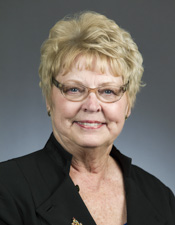Proposal calls for licensure board to evaluate teacher candidates
In an effort to overhaul a licensure system that supporters say has burdened the state’s ability to attract and keep qualified teachers for years, a conference committee met for the first time Monday morning to begin comparing two proposed solutions.
HF140*/SF4, sponsored by House Education Innovation Policy Committee Chair Rep. Sondra Erickson (R-Princeton) and Sen. Eric Pratt (R-Prior Lake) was passed 76-55 by the House April 3. It was amended and passed 44-21 by the Senate April 20.
No action was taken. Conferees are expected to continue discussion later in the week.
Legislating licenses
Both proposals would create a governor-appointed Professional Educator Licensing and Standards Board to oversee teacher licenses.
The board would evaluate qualified candidates according to state requirements and report annually on teacher preparation programs and school performance. Its creation would be a transfer of power from the Board of Teaching (which would dissolve) and the Department of Education.
But the board’s composition and responsibilities differ in each proposal.
Under the House version, the 11-member board would consist of six teachers, two superintendents, one principal, one teacher preparation program provider and one member of the public. It would also require the board to adopt rules providing for approval of teacher preparation programs.
The Senate proposal calls for a nine-member board consisting of five teachers, one superintendent, one school district human resources director, one principal and one member of the public. It would require the board to adopt rules to establish passing test scores for skills-based examinations, eliminate the use of “lifetime” licenses, provide specific renewal requirements, and similar to the House, approve teacher preparation programs. It would also require the Department of Administration to provide administrative support, and the Department of Education to provide offices at no cost until Jan. 1, 2020.
Both proposals would create a four-tier licensure system.
All teacher candidates are required to pass an examination of general teaching knowledge and licensure-specific skills, with each consecutive tier offering a specific license expiration and increased requirements. A so-called “licensure-by-portfolio” process would allow candidates to submit portfolios demonstrating teaching and content competence.
One major concern surrounding the proposed system regarded the qualifications under Tier 1.
Under both proposals, candidates with career and technical education certification, but without a bachelor’s degree from an accredited university, may apply for a license under the tier.
“As we balance the current problem of teacher supply, we don’t want to rush to decisions that, down the road, might lessen the quality of teachers in front of our kids,” said Education Commissioner Brenda Cassellius. “I feel strongly we should not have teachers without a bachelor’s degree. … I think that’s problematic. Eliminating the requirements for a bachelor’s degree just lowers the quality of teachers.”
Other concerns focused on the expedited timeline to implement such sweeping changes (specifically for small or rural school districts), cultural competency training for Tier 1 licenses, maintaining student-teaching as a component of teacher preparation, transparency in publicly reporting the amount and type of tiered-licenses per district and the suggestion that Tier 4 be reserved only for teachers with a master’s degree.
Nels Onstad, director of educator licensing with the Department of Education, recommended a phase-in component for the proposed changes that would detail an implementation process and timeline for school districts.
“I see it similar to two school districts consolidating. … If you try to merge everything at once it ends up causing stress, and results in two communities not getting along,” he said.
Although amicable, other minor differences remain. Among them, the Senate version would:
- require the governor to make his first appointment to the Professional Educator Licensing and Standards Board by Sept. 1, 2017;
- allow a retired Tier 2 or Tier 3 teacher to receive a lifetime qualified substitute teacher license; and
- allow academic and behavioral strategist licenses be issued or renewed without the requirement that the candidate hold a license in any other field.
Related Articles
Search Session Daily
Advanced Search OptionsPriority Dailies
Ways and Means Committee OKs proposed $512 million supplemental budget on party-line vote
By Mike Cook Meeting more needs or fiscal irresponsibility is one way to sum up the differences among the two parties on a supplemental spending package a year after a $72 billion state budg...
Meeting more needs or fiscal irresponsibility is one way to sum up the differences among the two parties on a supplemental spending package a year after a $72 billion state budg...
Minnesota’s projected budget surplus balloons to $3.7 billion, but fiscal pressure still looms
By Rob Hubbard Just as Minnesota has experienced a warmer winter than usual, so has the state’s budget outlook warmed over the past few months.
On Thursday, Minnesota Management and Budget...
Just as Minnesota has experienced a warmer winter than usual, so has the state’s budget outlook warmed over the past few months.
On Thursday, Minnesota Management and Budget...
